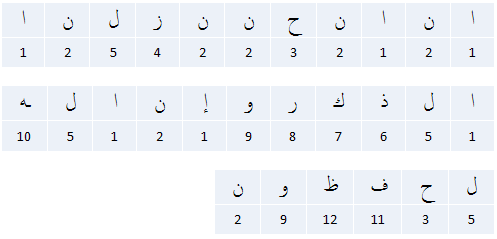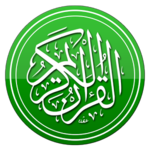God promises to guard the Holy Quran. He says in Chapter number 15 "Stoneland", Arabic: Al Hijr, الحجر in verse number 9:
![]()
Verily, We(a) have sent down the warning (Quran), and verily, We will be its guardian;
This verse consists of 28 Arabic letters, 12 unique ones. The vesre is structured in such a way that it yields some interesting mathematical phenomena. The number 7 is central in the Holy Quran, in the same manner it is in the Bible.
The total number of letters in this verse is 28 which is (a) equal to the number of letters in the Arabic Alphabet (Arabic is the language the Holy Quran was revealed in) (b) it is equal to 7 x 4
The verse contains 12 unique letters (that is, repeated excluded). Of those letters, 7 letters are part of the mysterious Quranic initials and 5 letters not.
fact here
We give each letter a numerical value according to its order of appearance in verse. The first letter Alef gets 1, the second letter Noon gets 2, the third letter to appear is Haa and gets thus 3 etc. The established values are applied to repeated letters (i.e. All Alef's get the value 1). Each letter gets a number according to its order of appearance in the verse. Look at the table below:

(note that the table has a right-to-left direction as the direction of Arabic language)
Let us consider these facts:
- We put all the numbers from the table above side by side right-to-left (as Arabic is) and get the number:
2912113510512198765112542232121
This number divides by 7 perfectly. It is equal to 7 x 416016215787456966444648890303
- Reversing the original number from the first point gives:
1212322452115678912150153112192
This number too divides by 7 perfectly. It is equal to 7 x 173188921730811273164307587456
- We go back to the table and this time we put the values side by side but this time from back to front (left-to-right). This gives the number:
1212322452115678912151053111292.
This number divides by 7 perfectly. It is equal to 7 x 173188921730811273164436158756
- Taking the number from last point and reversing it gives the number:
2921113501512198765112542232121
This number too divides by 7 perfectly. It is equal to 7 x 417301928787456966444648890303
There are some other intersting phenomena in this verse:
- Writing under each word the number of letters it has gives the number 62315533. This number divides by 7 perfectly. It divides also by 23 perfectly. 23 is the number of years the Quran was revealed in.
- Writing under each word the number of special letter it has (key opening letters of some Quran chapters such as Alef, Lam, Meem ا, ل, م or Ta, Ha ط, هـ) gives the number 32304433. This number divides by 7 perfectly.
- Writing under each word "1" if it has at least one letter of the Quranic initials (key opening letters of some Quran chapters such as Alef, Lam, Meem ا, ل, م or Ta, Ha ط, هـ) we get the number 11101111. This number divides perfectly by 7, by 23 (the number of years the Quran was revealed in), by 19 two times (which is a key number when it comes to numerical phenomena in the Quran), and by 191.
- Writing under each word the number of Alef, Lam, Ha letters ا, ل, هـ (i.e. the letters that constitute the word God - Allah - الله in Arabic) gives the nummber 12202202. This number divides by the number of occurrences of the word God in the Quran (2699) and remainder is 23.
- As said earlier the verse consist of 28 letters which is 7 x 4.
(a) In Arabic, the pronoun "We" refers to God himself. It is equal to saying "I". It has this meaning in the Quran and it is used by Kings to refer to themselves.

Comments
Salam Alaykoom:
Salam Alaykoom:
There are actually 29 letters and not 28. The alif after the ha in the word lahaafidoon in the end of the verse is missing. the word is pronounced lahaafidoon and not lahafidoon. so the vertical alif is missing
Please correct.
Jazak Allah Khayr
@Anonymous
@Anonymous
The verse is taken as it is from the Holy Quran. In Othamn writing (which is based on Revelation via Arch Angel Gabriel to Prophet Muhammad peace and blessings upon Him) dictates the writing of that word using Alef Khangareyah (small Alef) and this can be seen in many other words in the Holy Quran (e.g. The word Malek in ملك يوم الدين).
Add new comment